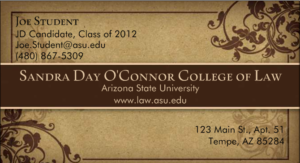I’ve probably made the biggest decision of my professional life thus far – I’m opening my own law firm. As Sam Glover told me, there’s no reason to wait to go solo.
I would have preferred to get some experience at a law firm, but I didn’t find one that was hiring that could have been the right fit. And in this economy, there are no legal jobs for most neophyte attorneys.

Over the last few years, I’ve accepted that I don’t want to work at a traditional law firm. I don’t want to work 80 hours a week, doing work that clients will refuse to pay for, have no life, develop severe chemical dependency problems, and have a heart attack or nervous breakdown before turning 40. I want to love what I do and be happy.
I am probably what Emily Leach calls genetically unemployable. Now, this doesn’t mean that I’m lazy or that I don’t want to work. It means I can’t work my ass off for someone else’s dreams. I have my own dreams. And if I don’t go after them now, then when?
Once I have my law license, I’ll be officially trading in the certainty of a paycheck for the freedom to set my own hours, choose my own clients, and to try to live the life I’ve always wanted. Â I want to foci of my law practice to be business formation, intellectual property, and internet law. I’m hoping that striking out on my own will also give me the freedom to write books and be a regular public speaker.
I’m taking Rachel Rodgers‘ Freedom Is The New Rich Teleclass and learning about how to operate a virtual law office. Essentially, my office will be wherever my laptop is. This year, my friend Brian Shaler has been essentially homeless because he’s been traveling all over the world. He works for himself so he can work from anywhere with an internet connection. Following his adventures has inspired me to travel more when I have the means.
Opening my own law firm has been exciting and petrifying. I’m sure I’ll have portions of the ethical rules memorized by the end of my first year because I feel like I have to consult it before doing anything. I’m grateful that I have incredible mentors helping me along the way. It’s comforting to remember that opening a law firm is relatively cheap and the ongoing overhead can be kept very low. I don’t need anything super fancy. I just need a system that works for me and my clients.
For now, I’m formulating what services I want to offer, determining where I’ll find clients, considering my rates, and what I want my website to look like while I wait to clear character and fitness. Oh yeah, and working my three jobs that are paying the bills until I become self-sufficient.




